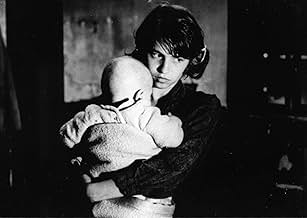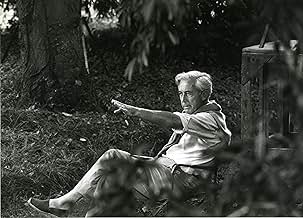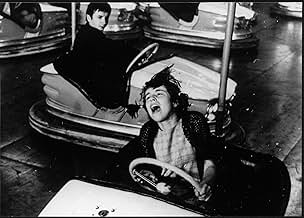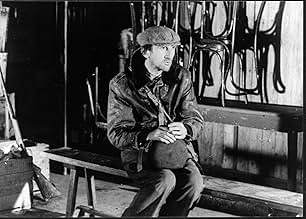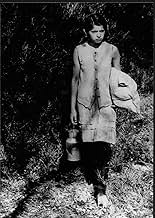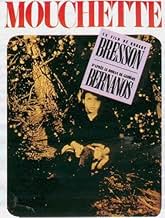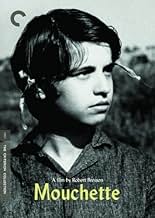VALUTAZIONE IMDb
7,7/10
13.678
LA TUA VALUTAZIONE
Una ragazza che vive nella campagna francese subisce continue umiliazioni, si trova costretta a lavorare per mantenere il fratellino, la madre è malata e il padre alcolizzato. Sopravvive fin... Leggi tuttoUna ragazza che vive nella campagna francese subisce continue umiliazioni, si trova costretta a lavorare per mantenere il fratellino, la madre è malata e il padre alcolizzato. Sopravvive finché un giorno viene violentata da un bracconiere.Una ragazza che vive nella campagna francese subisce continue umiliazioni, si trova costretta a lavorare per mantenere il fratellino, la madre è malata e il padre alcolizzato. Sopravvive finché un giorno viene violentata da un bracconiere.
- Regia
- Sceneggiatura
- Star
- Premi
- 5 vittorie e 1 candidatura in totale
Recensioni in evidenza
My Rating : 9/10
Bresson is heralded as an important filmmaker in world cinema. I absolutely love 'Mouchette' and it is a masterpiece of world cinema. It was on Tarkovsky's top 10 films list he made for Sight & Sound.
Bresson's other famous film Au Hasard Balthasar and Mouchette have common themes of abuse and negligence of the main characters. This film has the formal inevitability of tragedy, and is soaked through with a species of lyrical, desperate sadness. This quality, and the compelling aesthetic seriousness with which Bresson addresses his themes of suffering, compassion and the rural poor, are very remarkable indeed. Mouchette is a visionary, poetic film, fraught with elusive, unsettling meanings: a classic cinematic text.
Bresson is heralded as an important filmmaker in world cinema. I absolutely love 'Mouchette' and it is a masterpiece of world cinema. It was on Tarkovsky's top 10 films list he made for Sight & Sound.
Bresson's other famous film Au Hasard Balthasar and Mouchette have common themes of abuse and negligence of the main characters. This film has the formal inevitability of tragedy, and is soaked through with a species of lyrical, desperate sadness. This quality, and the compelling aesthetic seriousness with which Bresson addresses his themes of suffering, compassion and the rural poor, are very remarkable indeed. Mouchette is a visionary, poetic film, fraught with elusive, unsettling meanings: a classic cinematic text.
Mouchette is a young girl living in the country. Her mother is dying and her father does not take care of her. Mouchette remains silent in the face of the humiliations she undergoes. One night in a wood, she meets Arsene, the village poacher, who thinks he has just killed the local policeman. He tries to use Mouchette to build an alibi.
Robert Bresson knows how to make anything look beautiful. I always feel that black and white captures a scene better than color ever will, especially if the director (or cinematographer) knows how to really use the light and shadow Bresson gets it, and has always gotten it. He also seems to know ho to use children without exploiting them or making them overly sympathetic characters. The character of Mouchette is in many ways the queen of her own world... even if it may not be the best world.
Robert Bresson knows how to make anything look beautiful. I always feel that black and white captures a scene better than color ever will, especially if the director (or cinematographer) knows how to really use the light and shadow Bresson gets it, and has always gotten it. He also seems to know ho to use children without exploiting them or making them overly sympathetic characters. The character of Mouchette is in many ways the queen of her own world... even if it may not be the best world.
10mflamman
Sublime film from Robert Bresson!
Actually it was my first encounter with Bresson's work, five or six weeks ago. I was so eager to see it...Bresson's films ("Mouchette" and "Au hasard Balthazar") haven't disappointed me- to see the least!
"Mouchette" is such a pure film, so sublime. So powerful. When I saw this film, it really blew me away totally. So overwhelming. But now, weeks after that experience (I saw that films more than once, btw) it's still beginning to gain more power and emotion.
"Mouchette" has such overwhelming, graceful, brilliant images, shots and scenes. The opening scene may be the best ever: brilliant and pure, it tells everything you will see in the next hour and twenty minutes. The use of the music, sublime sounds of Monteverdi, is unique, powerful and brilliant. No more than- what is it?- ten seconds or so it can be heard. The opening scene is so short...
That's the power of Bresson: images, sounds, scenes are presented in such a brilliant way. When we are beginning to be attached to them, other images and shots are already presented. As a viewer, you can't really be attached totally by them. That's way these images, shots, scenes will be in your mind long after the film: all things, all scenes and situations, and especially all emotions (if they are shown at all) are shown in actually too short a time, that you, as a viewer, will be forced to "finish" them. You are forced to locate the emotions not shown, to locate the situations and details which are only suggestively shown. Bresson's editing is just brilliant, bt it may take some time before you are aware of that.
Some of the most brilliant scenes ever are presented here: Mouchette, forced to go into church by her father; Mouchette's brilliantly and superbly simple introduction to the viewer. Most notable for me, besides the ending scene of course, is the scene with Mouchette in the dodgem cars, having her only small feelings of joy and relieve. The expressions and emotions shown in this really magnificent scene, maybe the best and most emotional I've ever witnessed, are to diverse to even describe them. Just watch this scene...
Nadine Nortier, playing Mouchette, blew me away with her magnificent acting. So pure, sublime, graceful and heartfelt. One of the most striking peaces of "acting" I've ever seen...!
This superb film will be in my mind for ever, just like "Au hasard Balthazar". Nobody, not even the best like Dreyer, Ozu, Bergman and Tarkovsky, can present stories, images and "emotions" in such a superbly simple, transcendental and pure way as Bresson.
Masterpiece!
Actually it was my first encounter with Bresson's work, five or six weeks ago. I was so eager to see it...Bresson's films ("Mouchette" and "Au hasard Balthazar") haven't disappointed me- to see the least!
"Mouchette" is such a pure film, so sublime. So powerful. When I saw this film, it really blew me away totally. So overwhelming. But now, weeks after that experience (I saw that films more than once, btw) it's still beginning to gain more power and emotion.
"Mouchette" has such overwhelming, graceful, brilliant images, shots and scenes. The opening scene may be the best ever: brilliant and pure, it tells everything you will see in the next hour and twenty minutes. The use of the music, sublime sounds of Monteverdi, is unique, powerful and brilliant. No more than- what is it?- ten seconds or so it can be heard. The opening scene is so short...
That's the power of Bresson: images, sounds, scenes are presented in such a brilliant way. When we are beginning to be attached to them, other images and shots are already presented. As a viewer, you can't really be attached totally by them. That's way these images, shots, scenes will be in your mind long after the film: all things, all scenes and situations, and especially all emotions (if they are shown at all) are shown in actually too short a time, that you, as a viewer, will be forced to "finish" them. You are forced to locate the emotions not shown, to locate the situations and details which are only suggestively shown. Bresson's editing is just brilliant, bt it may take some time before you are aware of that.
Some of the most brilliant scenes ever are presented here: Mouchette, forced to go into church by her father; Mouchette's brilliantly and superbly simple introduction to the viewer. Most notable for me, besides the ending scene of course, is the scene with Mouchette in the dodgem cars, having her only small feelings of joy and relieve. The expressions and emotions shown in this really magnificent scene, maybe the best and most emotional I've ever witnessed, are to diverse to even describe them. Just watch this scene...
Nadine Nortier, playing Mouchette, blew me away with her magnificent acting. So pure, sublime, graceful and heartfelt. One of the most striking peaces of "acting" I've ever seen...!
This superb film will be in my mind for ever, just like "Au hasard Balthazar". Nobody, not even the best like Dreyer, Ozu, Bergman and Tarkovsky, can present stories, images and "emotions" in such a superbly simple, transcendental and pure way as Bresson.
Masterpiece!
After I watched Bresson's "Au Hasard Balthazar" a few years ago, I was advised by a friend to watch "Mouchette" next. I told him I wasn't particularly struck by the character development and the portrayal of humans and emotions in the former, and learned that I had the exact same problems with the latter.
The girl is amazing. Her justified rebellious behavior and her unique and authentic appearance really shine in this movie. Also, the photography in the film is very well done, as I would have dared to expect from Bresson. Technically, this movie certainly is very good.
However, the way people interact in this movie often doesn't make sense to me. And I know movies aren't obligated to be realistic, but this movie certainly has a lot of ingredients on board to make you believe it's trying to be realistic. It's not an absurd or surrealistic film where you won't have to expect to be able to completely understand emotions and social situations. The consequence is - to me at least - that my compassion doesn't know how to handle the situation. First something sad happens, and I get moved, but then there's weird silences or poetic expressions (not necessarily verbal) which don't fit the realistic context and interrupt the immersion if you ask me.
Another friend of mine with whom I discussed this topic mentioned a good point however: perhaps you should let go of the expectation to be moved emotionally. Doesn't the movie just try to display the story, possibly telling you to accept life for what it is without necessarily trying to move you? Well observed, it's possible. I still believe the movie could benefit strongly if it was more emotionally involving though.
I have had this discussion with a lot of people about several movies, and it seems nobody either understands or agrees with me on this subject. Therefore, I'm even more aware of how subjective this point of view is. Obviously, this movie isn't a classic for no reason and I'm sure it has plenty of qualities that let people appreciate it so much. Not entirely my cup of tea though.
The girl is amazing. Her justified rebellious behavior and her unique and authentic appearance really shine in this movie. Also, the photography in the film is very well done, as I would have dared to expect from Bresson. Technically, this movie certainly is very good.
However, the way people interact in this movie often doesn't make sense to me. And I know movies aren't obligated to be realistic, but this movie certainly has a lot of ingredients on board to make you believe it's trying to be realistic. It's not an absurd or surrealistic film where you won't have to expect to be able to completely understand emotions and social situations. The consequence is - to me at least - that my compassion doesn't know how to handle the situation. First something sad happens, and I get moved, but then there's weird silences or poetic expressions (not necessarily verbal) which don't fit the realistic context and interrupt the immersion if you ask me.
Another friend of mine with whom I discussed this topic mentioned a good point however: perhaps you should let go of the expectation to be moved emotionally. Doesn't the movie just try to display the story, possibly telling you to accept life for what it is without necessarily trying to move you? Well observed, it's possible. I still believe the movie could benefit strongly if it was more emotionally involving though.
I have had this discussion with a lot of people about several movies, and it seems nobody either understands or agrees with me on this subject. Therefore, I'm even more aware of how subjective this point of view is. Obviously, this movie isn't a classic for no reason and I'm sure it has plenty of qualities that let people appreciate it so much. Not entirely my cup of tea though.
Among the best things that can happen to me as a viewer is to watch a filmmaker grow into mastery, and I've just gone through a series of viewing where Bresson grew before my eyes. He wasn't a master before Balthazar in my estimation but he was one now.
See, he had started with ambitious work in Diary of a Priest, but something must have troubled him, the spiritual search was coming off as emotional anguish, resulting in sentimentality. His next three were all about finding ways to quell this, fasting the eye, muting the emotion.
This is all the more reason to celebrate him, because it could have gone either way. He could have turned out film after film where he mutes expression and turns actors into bare stumps and called it pure. But if this was purity, where was the life in which the pure is woven through? Bresson matters I believe because he left the stone floor of his ascetic phase to grow into this, his sculpting phase.
This is a sculpture of moving image and sound, even more so than Balthazar, even more purely about the rooms and spaces in which a young girl faces the duplicity of life. It's all in how he chisels the air with the camera, he does this in three parts.
The day before, with its moments of small everyday cruelty and unexpected kindness alike. She has a beautiful voice but won't sing with her classmates until forced, a passing woman unexpectedly gives her money for the bumping cars, but her dalliance with a boy is cut short and she has to go sit with her father. It's heart-aching because all she needs is someone to mind her and no one does outside of making her behave how they want to, most of us have been savaged this way as kids.
The night of unfathomable emotions out in the woods, and look how masterfully. Why she does what she does in the cabin, why she swears to protect his secret and professes love, perhaps intuitively protecting herself, perhaps asserting herself against authority, this is all as unfathomable as why the man goes back out to commit violence. It's all in that shot where the two men laugh, for no reason other than all this being absurd, beneath a dark sky, and the wind that blows all through the night.
In the third part of the film we have the day after, with this complicated human nature brought to the stark light of what other people think. Bresson shows us judgment and cynicism, and even the old woman's advice about death is waved off; too musty for a young girl, more advice.
So how poignant to see this shift in Bresson? He gives us by the end a more eloquent Jeanne D'arc, now the dogmatist interrogators become your small-minded neighbors and Joan is neither pure nor certain in any way about the truth of what she experienced. No ceremonial death. And how deep it cuts, that she may have wanted to ask her mother for advice, unburden the confusion, but has to go through it alone.
So after a series of Bresson viewings, I will come to rest here. Antonioni would take home the Palm that year but Bresson had conquered his obstacles and arrived fully. The title of Tarkovsky's book best describes what he does here, and you can see the Tati influence as a new tool that he didn't have back in Pickpocket. He sculpts an external time, but now in such a way that the pure is found where it grows roots and rustles, among life.
It would be Tarkovsky's turn now to shoulder this legacy, and Dreyer's, asking himself, what kind of time? We dream and yearn with an asymmetric logic and mingle with our reflection. It would be one of the great leaps in the cinema but for that we'd have to go forward.
See, he had started with ambitious work in Diary of a Priest, but something must have troubled him, the spiritual search was coming off as emotional anguish, resulting in sentimentality. His next three were all about finding ways to quell this, fasting the eye, muting the emotion.
This is all the more reason to celebrate him, because it could have gone either way. He could have turned out film after film where he mutes expression and turns actors into bare stumps and called it pure. But if this was purity, where was the life in which the pure is woven through? Bresson matters I believe because he left the stone floor of his ascetic phase to grow into this, his sculpting phase.
This is a sculpture of moving image and sound, even more so than Balthazar, even more purely about the rooms and spaces in which a young girl faces the duplicity of life. It's all in how he chisels the air with the camera, he does this in three parts.
The day before, with its moments of small everyday cruelty and unexpected kindness alike. She has a beautiful voice but won't sing with her classmates until forced, a passing woman unexpectedly gives her money for the bumping cars, but her dalliance with a boy is cut short and she has to go sit with her father. It's heart-aching because all she needs is someone to mind her and no one does outside of making her behave how they want to, most of us have been savaged this way as kids.
The night of unfathomable emotions out in the woods, and look how masterfully. Why she does what she does in the cabin, why she swears to protect his secret and professes love, perhaps intuitively protecting herself, perhaps asserting herself against authority, this is all as unfathomable as why the man goes back out to commit violence. It's all in that shot where the two men laugh, for no reason other than all this being absurd, beneath a dark sky, and the wind that blows all through the night.
In the third part of the film we have the day after, with this complicated human nature brought to the stark light of what other people think. Bresson shows us judgment and cynicism, and even the old woman's advice about death is waved off; too musty for a young girl, more advice.
So how poignant to see this shift in Bresson? He gives us by the end a more eloquent Jeanne D'arc, now the dogmatist interrogators become your small-minded neighbors and Joan is neither pure nor certain in any way about the truth of what she experienced. No ceremonial death. And how deep it cuts, that she may have wanted to ask her mother for advice, unburden the confusion, but has to go through it alone.
So after a series of Bresson viewings, I will come to rest here. Antonioni would take home the Palm that year but Bresson had conquered his obstacles and arrived fully. The title of Tarkovsky's book best describes what he does here, and you can see the Tati influence as a new tool that he didn't have back in Pickpocket. He sculpts an external time, but now in such a way that the pure is found where it grows roots and rustles, among life.
It would be Tarkovsky's turn now to shoulder this legacy, and Dreyer's, asking himself, what kind of time? We dream and yearn with an asymmetric logic and mingle with our reflection. It would be one of the great leaps in the cinema but for that we'd have to go forward.
Lo sapevi?
- QuizIt was rumored for years that the trailer for this film was by Jean-Luc Godard, and he has recently confirmed this by programming it in a self-curated retrospective of his work. The trailer is virtually a miniature essay on (or subversion of) the film, jarringly inter-cutting excerpts from it with a written commentary that calls it "Christian and sadistic."
- Blooper(at around 1 min) The canteen changes position after being dropped.
- ConnessioniEdited into Bande-annonce de 'Mouchette' (1967)
- Colonne sonoreMagnificat
Written by Claudio Monteverdi
Performed by Les Chanteurs de St. Eustache
Conducted by R.P. Émile Martin
I più visti
Accedi per valutare e creare un elenco di titoli salvati per ottenere consigli personalizzati
- How long is Mouchette?Powered by Alexa
Dettagli
- Data di uscita
- Paese di origine
- Lingua
- Celebre anche come
- Mouchette
- Luoghi delle riprese
- Apt, Vaucluse, Francia(landscape scenes)
- Aziende produttrici
- Vedi altri crediti dell’azienda su IMDbPro
- Tempo di esecuzione1 ora 21 minuti
- Colore
- Mix di suoni
- Proporzioni
- 1.66 : 1
Contribuisci a questa pagina
Suggerisci una modifica o aggiungi i contenuti mancanti

Divario superiore
By what name was Mouchette: Tutta la vita in una notte (1967) officially released in India in English?
Rispondi
